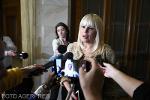NBR has taken one more step towards making lending in RON more expensive, when it upped the key rate by 0.5%, to 8% a year yesterday. Analysts believe that sooner or later customers will feel the tightening of the monetary policy through the increase in deposit and credit interests, particularly because of the increases through probable for the coming period.
The central bank explains the decision it made yesterday was prompted by the recent rapid private lending increase, which keeps consumption at unsustainable levels.
"The analysis of the latest statistical data reveals that domestic demand remains high as a result of investment expansion and of the consumption remaining at unsustainable levels given the higher speed at which lending to the private sector, and especially that in foreign currency is increasing," NBR's Board of Governors explains. The central bank, however, does not have any leverage left to use to influence the cost of foreign currency loans significantly, given that bankers have found ways to dodge restrictions over the last few years.
Still, some analysts believe increases for the mandatory foreign currency reserves may happen in the future.
Ionut Dumitru, head of Raiffeisen Bank's research department believes that after the increases of the monetary policy rate, interests offered to customers will inevitably increase. "Banks are pressured by competition, yet they only are waiting for someone to take the first step and then rally," Dumitru says. He anticipates new increases of the key rate for RON.
Florian Libocor, BRD-SocGen's chief economist does not expect an immediate impact on the lending growth rate, after NBR's decision yesterday. Still, he emphasises that NBR will most likely raise the interest rate by half a percentage point again during the next meeting in February.
Those that have loans in RON to rep




